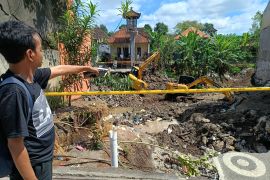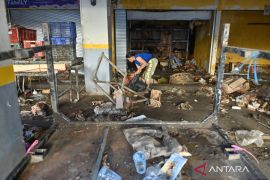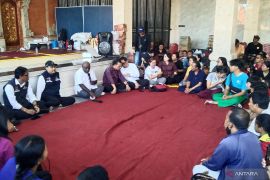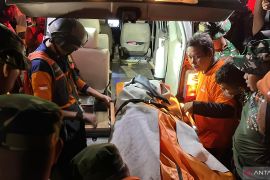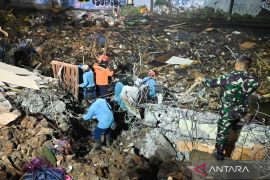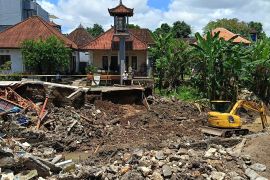Spokesman of the Bali chapter of the PMI Dr I Gede Wiryana Patrajaya stated in Denpasar on Monday that the Red Cross of Indonesia and Hong Kong have sought to empower Balis communities to actively prevent HIV/AIDS in the region.
The number of HIV/AIDS cases in Bali has increased from year to year, indicating that the disease has spread to rural areas.
In light of this, Patrajaya noted that the training program on the prevention of HIV/AIDS conducted in cooperation with the Hong Kong Red Cross is expected to continue in a bid to thwart the spread of the deadly disease to others.
"Together, let us participate and support the continuation of this program to prevent the spread of the scary disease of HIV/AIDS in the island of paradise," Patrajaya affirmed.
The spokesman further expressed hope that all public elements in Bali would play an active role in supporting the PMI and Hong Kong Red Cross program to prevent the spread of HIV/AIDS.
In the meantime, Hong Kong Red Cross International Aid Services Department staff Terry C.H. Wong affirmed that the Hong Kong Red Cross fully supported the PMI in the efforts to prevent the spread of HIV/AIDS by involving the local communities.
"We cooperate with the PMI because at this time, HIV/AIDS cases in Indonesia require special attention and prevention efforts, and they should be made from now on," Wong emphasized.
He acknowledged that the Hong Kong Red Cross had worked with the PMI since 2004 in response to disasters, such as the tsunami in Aceh.
Moreover, cooperation in the HIV/AIDS prevention program has been well established since 2012 to 2015 and is expected to continue in a sustainable manner.
"We fully support the PMI in order to continue to empower the communities for the prevention of this disease, and we hope the training by the PMI officers will continue to be improved in Denpasar and the districts of Badung and Buleleng where the highest number of HIV/AIDS cases have been found," he remarked.
In the meantime, Head of the Health Division of the PMI Center Dr Moch Arfan has expressed his strong support to the HIV/AIDS prevention program being carried out by the Bali chapter of the PMI and the Hong Kong Red Cross.
"This preventive and rehabilitation program should continue to be followed up as it has a very positive impact on the public, especially the younger generation," Arfan noted.
He pointed out that the right approach to implementing the disease prevention program is to educate the public, especially the youth, at an earlier stage, so that they can avoid using drugs and engaging in sexual activity with multiple partners.
According to Arfan, the program is in line with the governments efforts to suppress the high incidence of the disease in Indonesia, and so, it needs the support of all parties to prevent the spread of HIV/AIDS.
Arfan explained that the disease continued to spread in Indonesia, and by the end of 2014, a total of 150,762 people were recorded to have suffered from HIV, and 55,250 others from AIDS.
"To this end, the PMI wants to play an active role to curb the high number of cases through prevention and changing the peoples behavior, so that the risk of the disease can be suppressed," he emphasized.
Bali Provincial Health Service Chief Dr Ketut Suarjaya said in February, this year, that 75 percent of commercial sex workers in Bali have tested positive for HIV.
"We obtained the figure from our survey and the data received from the Kerti Praja Foundation and other non-governmental organizations in Bali," he remarked in Denpasar at the time.
He pointed out that the total number of commercial sex workers in Bali was estimated to be six thousand.
He said that of the 75 percent commercial sex workers tested positive for HIV in Bali, most of them resided in the tourist area of Sanur, followed by the Kuta area and belonged to the age group of 19-39 years.
"Therefore, we expect the public to not engage in risky sexual behaviors, especially with people who are at risk of contracting the disease," Suarjana remarked.
To prevent the spread of HIV/AIDS, Suarjana said his party had made various efforts to prevent and treat HIV/AIDS and had also undertaken health promotion initiatives.
He explained that prevention is carried out by raising awareness among the public, especially the younger generation, through the AIDS care village cadres, AIDS and Drugs care student cadres, and AIDS care group students.
With regard to treatment, Suarjaya noted that antiretroviral drugs (ARVs) had been provided to the people who tested positive for HIV to prevent transmission and reduce incidence of the disease.
(O001/INE)
EDITED BY INE
(O001/KR-BSR/A014)
Reporter: Otniel Tamindael
Editor: Jafar M Sidik
Copyright © ANTARA 2015

